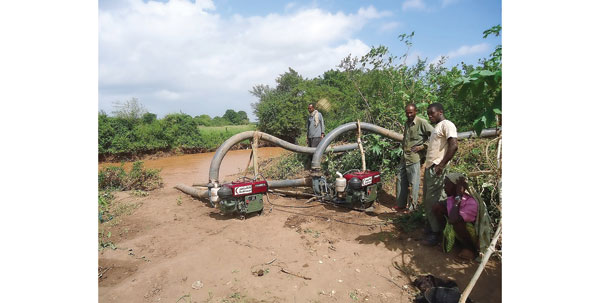
Saturday May 17, 2014

Somalis irrigating their farms with the help of pumps procured by QRC.
newinsideDoha: Qatar Red Crescent (QRC) continues to intensify relief and development efforts in Somalia to save the victims of drought and improve their quality of life in the face of critical economic and security conditions.
Prior to the completion of urgent relief work, QRC initiated development projects to help local populations recover from the impact of the drought and restore their normal life by providing services in the fields of healthcare, food security, water and sanitation, and economic empowerment.
The projects have served 184,948 people so far, at an overall cost of QR2,848,041.
The first project following the end of the drought was the establishment of a centre for tropical diseases in Afgooye, the southeastern Lower Shebelle region, to provide healthcare in the agricultural environment where tropical and communicable diseases prevail. Costing QR1,298,450, the centre serves 30,000 people (6,000 families) annually or 110 patients a day on average.
QRC participated in the expansion and rehabilitation of the Bosaso Public Hospital in the Puntland state, which was in a bad condition due to lack of upgrade and maintenance amid failed state authorities. The contribution involved financing almost 50 percent of the expansion, increasing capacity to 150 beds at a cost of QR329,425.
New departments were opened in different medical specialities, such as general surgery, emergency medicine, paediatrics, orthopaedics, obstetrics, and gynaecology. The hospital receives 700,000 patients a year.
A healthcare centre was opened in Sbeib town at a cost of QR538,302 to offer basic services, free medications, and health education to 15,000 people (3,000 families). It is visited by 67 patients a day on average from five agricultural towns.
QRC provided 30,000 returnees (6,000 families) with two-month food, non-food items, sheltering requirements, and personal and stuff transportation back to their home towns to ensure permanent settlement.
In the water and sanitation field, six surface wells were dug to supply clean water for 28,875 farmers (5,775 families) from five towns at a cost of QR248,200.
Ten main irrigation canals were rehabilitated to support agricultural production, with several bridges built across them.
To ensure economic empowerment, 10,675 farmers (2,135 families) were targeted with support and training to resume their work in farms at a cost of QR433,664 to cover the project, including reclamation of 460 hectares for 460 families, distribution of 6.3 tonnes of high-quality seeds, training of 175 farmers in improved agricultural methods, and procurement of 10 irrigation pumps.
In the field of training and education, weekly lectures were held to introduce medical workers to the most prevalent diseases and how to diagnose, treat and prevent them. The 61 lectures were attended by 398 trainees, staff members and technicians working in QRC projects.
A specialised medical nutrition therapy course, the first for a long time, was held for 40 doctors, nurses and student doctors.
The QRC office in Somalia coordinated with and worked under the wings of international organisations such as the United Nations, International Federation of Red Cross and Red Crescent and Organisation of Islamic Cooperation. The office also co-implemented development activities with organisations such as Turkish Red Crescent, Somali authorities, and local foundations.
QRC was among the first international organisations to respond to humanitarian appeals to serve thousands of Somalis affected by the 2011 drought, which resulted in deteriorating humanitarian conditions and mass internal migration in search of food.
It launched urgent relief programmes to provide basic needs, particularly food, healthcare, and sheltering, with a focus on the worst-affected southern provinces. The Peninsula